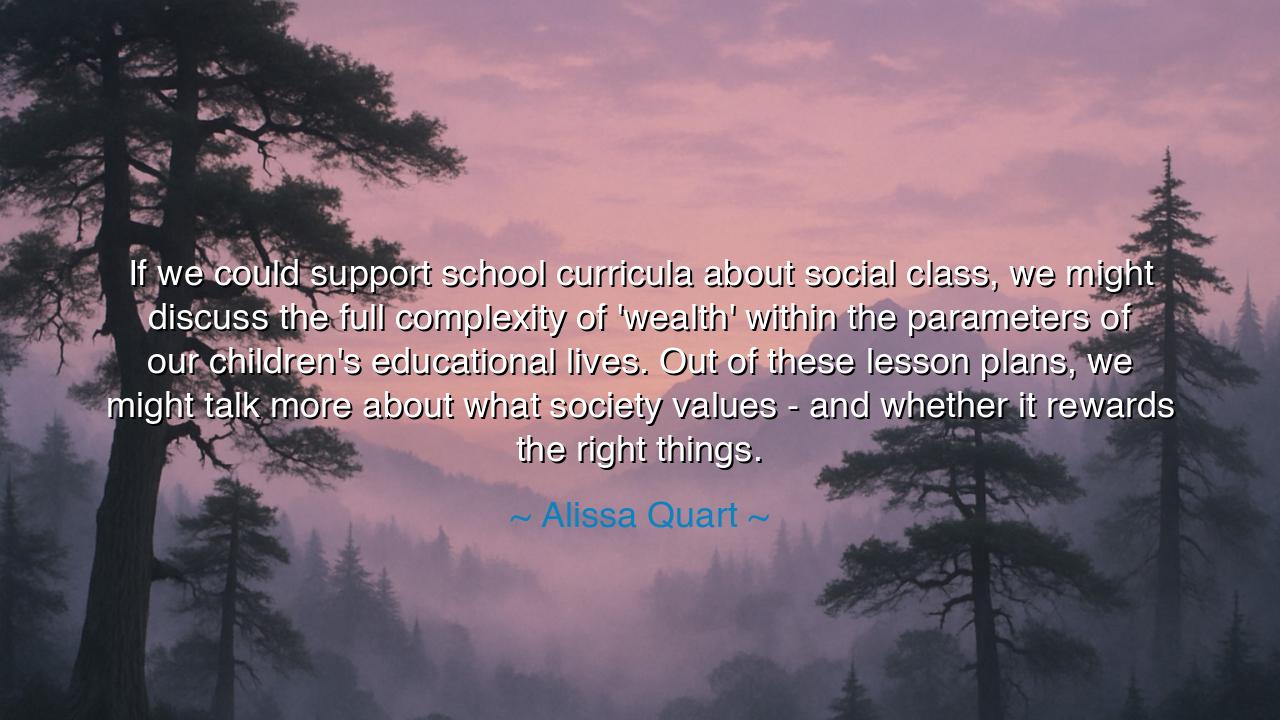
If we could support school curricula about social class, we might
If we could support school curricula about social class, we might discuss the full complexity of 'wealth' within the parameters of our children's educational lives. Out of these lesson plans, we might talk more about what society values - and whether it rewards the right things.






Hear the voice of Alissa Quart, who gazes upon the halls of learning and speaks with the clarity of one who longs for justice: “If we could support school curricula about social class, we might discuss the full complexity of wealth within the parameters of our children’s educational lives. Out of these lesson plans, we might talk more about what society values—and whether it rewards the right things.” These words carry the weight of an ancient oracle, for they remind us that the foundation of every civilization is not gold nor stone, but the minds of its children and the truths they are taught.
The word wealth has long been misunderstood. In the eyes of many, it is counted in coins, lands, and treasures. But to the wise, wealth is broader, more subtle, more sacred. It lies also in time, in dignity, in health, in knowledge, and in the bonds of community. To teach children only that wealth is money is to train them to chase shadows. But to unveil to them its complexity is to grant them the tools to discern what is worth seeking, what is worth building, and what is worth defending.
Consider the tale of Athens, where boys were not taught merely numbers and arms, but also philosophy, poetry, and debate. They were guided to ask questions of the polis: What makes a good life? What makes a just man? Though Athens fell to Sparta’s might, its wisdom outlived its conquerors. From its lessons came Socrates, Plato, and Aristotle, whose voices echo still. What gave them this endurance? It was not blind training, but an education that dared to explore values, justice, and the meaning of prosperity. Quart’s vision mirrors this: a school curriculum that opens the minds of children to the depth of human life, not just the surface of material gain.
For if we do not teach the young about social class, about the structures that raise some high and press others low, they will inherit society’s inequalities blindly, without the knowledge to question or to change them. The Romans too learned this lesson, as their Republic hardened into Empire. The senators grew fat in villas, while the plebeians crowded into slums. Without education to bridge understanding, resentment burned, and the harmony of the Republic was lost. A society that fails to examine what it values eventually becomes a society that crumbles under the weight of its own blindness.
The teaching of wealth must not be confined to money, but must ask: Does society reward the healer as much as the speculator? Does it honor the teacher as it honors the conqueror? Does it lift the laborer as it lifts the merchant? When these questions are neglected, a people begin to worship false idols—profit above wisdom, appearance above substance, and gain above justice. Quart’s call is a call to awaken children early, before these false idols are enthroned in their hearts.
The lesson for us is luminous: education is the furnace where the future is forged. If we temper it only with arithmetic and trade, we may raise clever merchants, but we will not raise wise citizens. But if we blend into it the metals of ethics, philosophy, and social understanding, then from it will emerge a generation capable not only of prospering, but of discerning the true nature of wealth and guiding society’s values toward the just and the good.
Therefore, let us take practical action: support schools that broaden their teachings, encourage teachers who dare to speak of justice and class, and as parents or mentors, fill the gaps with our own voices. Discuss openly with children what is valued and why. Praise kindness as much as achievement, wisdom as much as success, integrity as much as ambition. For every lesson planted in young minds becomes the harvest of the future.
And so, the teaching stands: the destiny of a people rests not in their riches, but in what they teach their children to call wealth. To defend truth in education is to defend the soul of civilization itself. Let us guard this truth as the ancients guarded their fires, and pass it, undimmed, to those yet to come.






AAdministratorAdministrator
Welcome, honored guests. Please leave a comment, we will respond soon